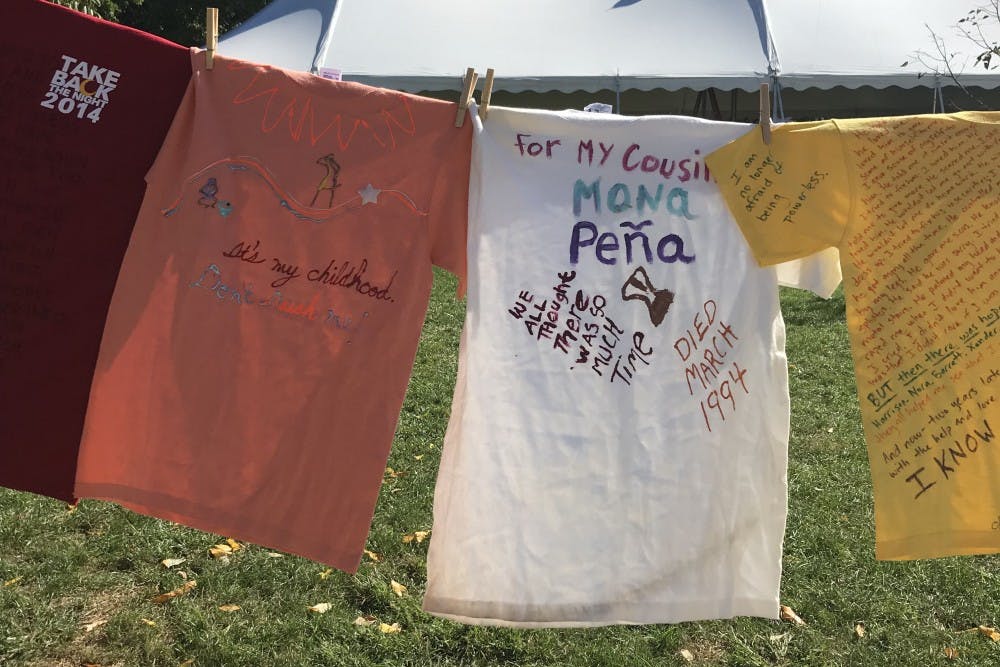Colorful t-shirts flapped in the breeze outside New Cabell, each emblazoned with a message written by a survivor of intimate partner violence. Events held by the Maxine Platzer Lynn Women’s Center taking place on Grounds and activities by student groups are part of a broader push for education and community engagement during Domestic Violence Awareness Month.
“At the Women’s Center we have a whole program on Gender, Violence, and Social Change and we’ve been doing this work for a long time,” said Claire Kaplan, director of the center’s gender violence and social change program.
The events and activism during this month on Grounds highlight two kinds of abuse — domestic violence and intimate partner violence.
“Intimate partner violence is a broader term, so that’s including any kind of intimate relationship, so same-sex relationships, dating,” Kaplan said. “Often when people think of domestic violence they think of married couples with kids, that kind of thing, and in the law that’s actually the case in Virginia. You have to be cohabitating, married, have a child in common, that type of thing. But most people, at least undergraduates, are doing none of the above. Some are, but most are in a relationship.”
Domestic violence is related, but has distinct qualities, according to Kaplan.
“Domestic violence is a pattern of behaviors, using power and control in the context of a relationship and is intended for control of one partner by another,” Kaplan said. “The key pieces are that it is about power and control, it’s in a relationship and it has to happen more than once.”
On Grounds, the issue has been made clearly visible, through both tabling by the Women’s Center on the Lawn and the events in October.
“These are events to make the issue visible since a lot of college students do experience intimate partner violence or domestic abuse, even though we don’t typically think of it as something that can happen to college students,”said Hannah Mezzacappa, a fourth-year College student and Gender Violence and Social Change intern. “It’s important to raise awareness about this issue and issues of gender based violence in general.”
Education and activism about domestic violence has been steadily growing, but the murder of University student Yeardley Love in 2010 caused a rise in awareness, Kaplan said.
Yeardley Love was a University student and athlete killed by ex-boyfriend and University student George Huguely in 2010. Huguely was convicted on charges of first-degree murder and sentenced to 23 years in prison.
“The awareness was sort of incrementally growing over the years and became really obvious when Yeardley Love was murdered by her boyfriend George Huguely,” Kaplan said. “Though we had had students murdered in the past by partners, it just didn’t somehow seem to get the attention. The work of her [Love’s] family has been pretty significant in terms of educating nationally about this issue.”
The campaigns that were hosted around Grounds are part of a broader push for education by organizations like the Virginia Sexual and Domestic Violence Action Alliance and a push for updated laws in the Virginia General Assembly.
The Red Flag campaign is a push for awareness, education and the importance of bystander intervention for students on college campuses.
“The Red Flag campaign is something that was devised by the Virginia Sexual and Domestic Violence Action Alliance for college campuses,” Kaplan said. “It’s awareness, it’s really strictly posters and media and stuff. It’s not a particular curriculum, but it’s about bystander intervention and what peers can do if their friends are having difficulties.”
All students were invited to participate in the Red Flag campaign that took place last week, not just survivors of violence.
“Anyone can write on a red flag,” Mezzacappa said during the event. “What happens is that you can either write a red flag, or warning sign or an abusive relationship, or you can write a positive relationship form instead.”
The other campaign that took place on the Lawn was the clothesline project, where messages from victims were publicly displayed on hanging shirts.
“This is only for survivors of gender-based violence. They can write whatever they would like on a t-shirt and we hang it on the clothesline. So of them can be pretty intense, so we have this trigger warning here,” Mezzacappa said. “It’s supposed to be empowering, raising awareness while still raising the voice of the survivor.”
As for the General Assembly, Kaplan referenced a change in attitude following Love’s murder that led to more inclusive laws to protect non-married and dating victims.
“The laws actually actually did not include those types of relationships, so if someone was being abused, they couldn’t get a protective order, they couldn’t use the resources that someone who was married could get, even if they were being terrorized by someone,” Kaplan said. “It was actually Yeardley’s murder that kind of woke up the General Assembly, even though we had been trying for years to get some laws that would include dating couples.”







